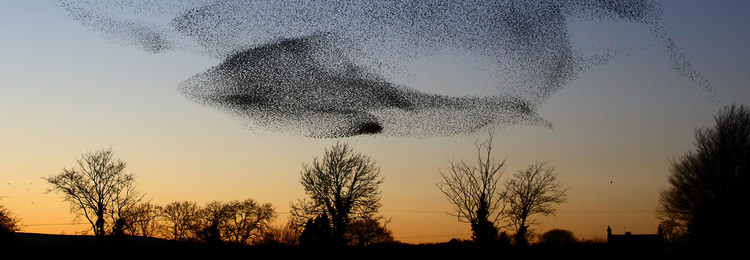
Bees come in swarms and fish come in schools. Starlings, in the area around Edinburgh, in the moors of England, come in something called a murmuration, and the murmuration refers to the murmuring of the wings of the birds, and throughout the day the starlings are out over a 20-mile radius sort of doing their starling thing. And at night they come together and they create one of the most spectacular things in all of nature, and it’s called a murmuration. And scientists that have studied this have said they’ve never seen an accident. Now, this thing has a function. It protects the birds. You can see on the right here, there’s a predator being chased away by the collective power of the birds, and apparently this is a frightening thing if you’re a predator of starlings. And there’s leadership, but there’s no one leader.
Now, is this some kind of fanciful analogy, or could we actually learn something from this? Well, the murmuration functions to record a number of principles, and they’re basically the principles that I have described to you today. This is a huge collaboration. It’s an openness, it’s a sharing of all kinds of information, not just about location and trajectory and danger and so on, but about food sources. And there’s a real sense of interdependence, that the individual birds somehow understand that their interests are in the interest of the collective.
Perhaps like we should understand that business can’t succeed in a world that’s failing.
Well, I look at this thing, and I get a lot of hope. Think about the kids today in the Arab Spring, and you see something like this that’s underway.
And imagine, just consider this idea, if you would: What if we could connect ourselves in this world through a vast network of air and glass? Could we go beyond just sharing information and knowledge? Could we start to share our intelligence? Could we create some kind of collective intelligence that goes beyond an individual or a group or a team to create, perhaps, some kind of consciousness on a global basis? Well, if we could do this, we could attack some big problems in the world.
And I look at this thing, and, I don’t know, I get a lot of hope that maybe this smaller, networked, open world that our kids inherit might be a better one, and that this new age of networked intelligence could be an age of promise fulfilled and of peril unrequited.
Let’s do this.
–Don Tapscott in his TED Talk, “Four Principles for the Open World.”
Image: "Starling Murmuration" by Edd Cottell.
